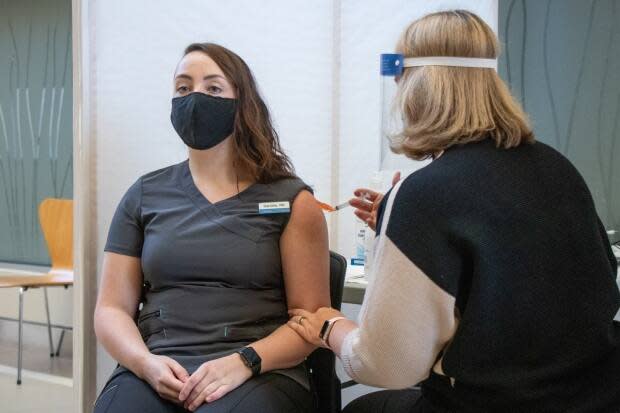Retired health-care workers gearing up to help with COVID-19 vaccines
Vaccinating close to a million people in less than a year is likely going to take more hands to accomplish than Nova Scotia's health-care system currently has on deck.
That's why regulatory bodies like the Nova Scotia College of Nursing are offering to relicense former health-care professionals to help with the massive COVID-19 vaccination program.
The college put out a call to retired nurses last week to sign up for free temporary licences — a program meant primarily to bolster the vaccine workforce and help with other aspects of the COVID-19 response like contact tracing and assessment.
In the first seven days, the college handed out 139 emergency conditional licences.
Janet Hazelton, president of the Nova Scotia Nurses Union, said she expects far more nurses will sign up in the months ahead as the vaccine rollout is supposed to ramp up.
"We're always nurses, regardless of when we retire. Many [nurses] have retired, but are still anxious to help out," Hazelton said in an interview.

The union isn't involved in the relicensing program, but Hazelton said phones at her office have been ringing off the hook with questions about helping with vaccine efforts.
Hazelton said there are hundreds of nurses in Nova Scotia who, like herself, don't currently work in clinical settings but have maintained their licences to practise.
She said reassigning some people from administrative roles to vaccine clinics could help keep other health services running uninterrupted.
"It's an opportunity for us to vaccinate because we have the skills to do that, and to keep as many nurses as we can at the bedside doing what they do best: looking after patients," she said.
The Nova Scotia College of Nursing launched a similar program last spring to help with the COVID-19 response, and almost 200 nurses reactivated their licences. At that time, the program was open to people who had practised within the past five years. This year's iteration includes nurses who have practised within the past 10 years.
The temporary licences from the college are valid for four months starting when the individual is selected for work — and Nova Scotia's health authority has been looking to hire.
Several job postings recently closed for workers across the province to support COVID-19 vaccinations. They were open to paramedics, registered nurses, licensed practical nurses, midwives, nurse practitioners and pharmacists.
At a COVID-19 briefing earlier this week, Dr. Robert Strang, the province's chief medical officer of health, said he expects more health-care regulators, including the College of Physicians and Surgeons of Nova Scotia, will soon introduce rapid relicensing programs.
Dr. Chris Randall, a retired physician in Yarmouth, N.S., came out of retirement last year when the college first offered temporary licences in response to the pandemic. He was assigned to a COVID-19 unit but didn't end up seeing any patients. It was boring, he said, but he didn't mind.
"We're trying to make people well," he said. "When we don't see sick people, that's absolutely great."
Randall said he wouldn't hesitate to reactivate his licence again to help with the vaccination effort should the health system need his help.
MORE TOP STORIES

 Yahoo Movies
Yahoo Movies 